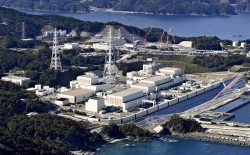Ishiba Swallows Opposition Demands to Get Budget Passed; Behind-the-Scenes Negotiations Help Bring CDPJ into Line with Ruling Parties

Prime Minister Shigeru Ishiba bows after the House of Representatives passed the fiscal 2024 supplementary budget bill in the Diet on Thursday.
21:00 JST, December 13, 2024
It required courting multiple opposition parties — and sometimes swallowing their demands whole — but Prime Minister Shigeru Ishiba managed to get the fiscal 2024 supplementary budget bill passed by the House of Representatives on Thursday.
However, knotty issues such as how to secure additional financial resources have been shelved for now, so whether Ishiba’s approach will be successful in the future remains unclear.
The ruling coalition of the Liberal Democratic Party and Komeito suffered a heavy defeat and lost its majority in the recent lower house election, as a result of which Ishiba was forced to humble himself and seek the cooperation of opposition parties.
Ishiba, who is LDP president, first set his sights on the Democratic Party for the People, as getting them on board would give the ruling bloc a majority in the chamber.
LDP Secretary General Hiroshi Moriyama was tasked with coordinating talks between the parties. The DPFP had been calling for the “¥1.03 million barrier,” the annual income threshold above which tax is levied, to be raised to “around ¥1.78 million.” On Wednesday, Moriyama decided on a compromise that delicately deferred the issue by agreeing to “aim for ¥1.78 million.” The secretaries general of the LDP, Komeito and DPFP exchanged written agreements, leapfrogging discussions among the three parties’ tax research commissions, which had been negotiating on issues including massive alternative revenue sources.
Close personal ties vital
The cooperation of the Constitutional Democratic Party of Japan was also crucial for Ishiba.
The lower house’s Budget Committee is chaired by Jun Azumi, who previously served for a long time as CDPJ Diet Affairs Committee chairperson. Azumi’s post gives him significant influence over the scheduling of Budget Committee meetings and procedures during those meetings.
Azumi has close connections to Moriyama, who also has significant experience serving on his own party’s Diet Affairs Committee. Both men worked together behind the scenes and were instrumental in the compilation of a revised budget bill Wednesday that would allocate ¥100 billion from reserve funds for restoration and reconstruction projects in the Noto Peninsula, which was battered by a devastating earthquake in January and flooding in September. These talks were vital to the budget bill’s passage Thursday.
“It had been impossible for us to agree on the supplementary budget bill,” a senior CDPJ official admitted to The Yomiuri Shimbun. “But these revisions demonstrated that this is a new Diet in which the ruling and opposition parties are on equal footing.”
Last week, Moriyama held talks in the Diet with Japan Innovation Party coleader and old friend Seiji Maehara. Moriyama indicated to Maehara that the ruling parties were willing to move forward with talks on making education free, which is a key policy plank of the JIP.
On Thursday morning, the heads of the LDP, Komeito and JIP policy research committees agreed to establish a consultative body to examine the free education issue. This was sufficient for the JIP to also throw its support behind the supplementary budget bill.
Fear of missing out
The overall success of the LDP’s efforts was largely due to their movements, as the clock ticked down to the vote on the bill, to coordinate separately but simultaneously with disunified opposition parties to encourage them to act fast, on the grounds that “being slow to join with the ruling parties would be to their detriment,” in the words of a senior JIP official.
The supplementary budget bill contains spending for disaster restoration and reconstruction projects, as well as funds for the 2025 Osaka-Kansai Expo. Consequently, the opposition camp also could not afford to significantly delay the bill’s passage.
Some LDP members have grumbled about the party’s willingness to accept so many budget demands from other parties. “We lost our independence and conceded too much,” a senior member of the LDP’s Tax System Research Commission said.
With a House of Councillors election scheduled to be held in summer 2025, the opposition parties will inevitably adopt a more confrontational stance toward the ruling parties during next year’s ordinary Diet session. Many observers predict it will be difficult for Ishiba to get through this period using the tactics he used to get the supplementary budget bill across the line. Ishiba himself also seems aware that a perilous path lies ahead.
“The next fiscal year’s budget will be a crucial phase,” Ishiba reportedly told a close aide. “The opposition parties will probably come at us hard.”
Tax changes and lost revenue
The LDP, Komeito and the DPFP have agreed to abolish the provisional portions of gasoline taxes. The agreement does not specify the timing of the abolition, and a detailed roadmap will be discussed later. Tough discussions are expected as several issues are still untouched, such as how to secure finances to make up for the loss of the provisional tax funds.
The government estimates that completely abolishing the provisional portions of gas taxes would remove ¥1.5 trillion in funding from the national and local governments. It is hard to say the latest three-party discussions were sufficient in terms of sources of funds to make up for the loss and measures to support municipalities that will be affected. It has also been pointed out that decreasing the price of gasoline runs counter to measures to decarbonize and reduce greenhouse gas emissions.
As for the “¥1.03 million barrier” for income tax, which the three parties have also agreed to raise, the government has calculated that, if the size of the basic tax deduction — currently ¥480,000 in principle — is raised to ¥750,000 as the DPFP demands, it will eliminate about ¥7 trillion-¥8 trillion in revenue. The three-party talks will now have to focus more intensely on ways to secure revenue sources, on top of provisional gasoline taxes.
Related Tags
Top Articles in Politics
-

Japan PM Takaichi’s Cabinet Resigns en Masse
-

Sanae Takaichi Elected 105th Prime Minister of Japan; Keeps All Cabinet Appointees from Previous Term
-

Japan’s Govt to Submit Road Map for Growth Strategy in March, PM Takaichi to Announce in Upcoming Policy Speech
-

LDP Wins Historic Landslide Victory
-

LDP Wins Landslide Victory, Secures Single-party Majority; Ruling Coalition with JIP Poised to Secure Over 300 seats (UPDATE 1)
JN ACCESS RANKING
-

Japan PM Takaichi’s Cabinet Resigns en Masse
-

Japan Institute to Use Domestic Commercial Optical Lattice Clock to Set Japan Standard Time
-

Israeli Ambassador to Japan Speaks about Japan’s Role in the Reconstruction of Gaza
-

Man Infected with Measles Reportedly Dined at Restaurant in Tokyo Station
-

Man Infected with Measles May Have Come in Contact with Many People in Tokyo, Went to Store, Restaurant Around When Symptoms Emerged


















